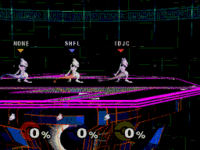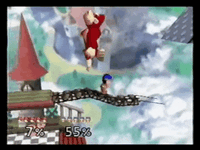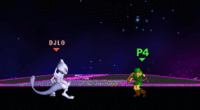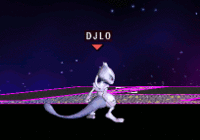| Welcome to SmashWiki! Log in or create an account and join the community, and don't forget to read this first! |
| Notices |
|---|
| The Skill parameter has been removed from Smasher infoboxes, and in its place are the new "Best historical ranking" and "Best tournament result" parameters. SmashWiki needs help adding these new parameters to Smasher infoboxes, refer to the guidelines here for what should be included in these new parameters. |
| When adding results to Smasher pages, include each tournament's entrant number in addition to the player's placement, and use the {{Trn}} template with the matching game specified. Please also fix old results on Smasher pages that do not abide to this standard. Refer to our Smasher article guidelines to see how results tables should be formatted. |
| Check out our project page for ongoing projects that SmashWiki needs help with. |
Double jump cancel: Difference between revisions
mNo edit summary |
m (moving category) |
||
| Line 45: | Line 45: | ||
[[Category:Techniques (SSBM)]] | [[Category:Techniques (SSBM)]] | ||
[[Category:Techniques (SSB)]] | [[Category:Techniques (SSB)]] | ||
[[Category:Advanced | [[Category:Advanced techniques]] | ||
[[Category:Glitches (SSB)]] | [[Category:Glitches (SSB)]] | ||
[[Category:Glitches (SSBM)]] | [[Category:Glitches (SSBM)]] | ||
Revision as of 20:33, April 29, 2018
The double jump cancel, sometimes abbreviated as DJC, is a technique in Super Smash Bros. and Super Smash Bros. Melee usable by Yoshi, Ness, Peach, and Mewtwo. These characters have what is known as a delayed double jump, and thus they can jump and double jump from the ground, then attack immediately afterward to cancel their upward momentum and land on the ground soon after their attack. (Without the double jump cancel, the player would have to wait out the full length of the jump or double jump before being able to land.) This tactic is used to perform aerial attacks much more quickly than normal, thus enabling aerial combos and allowing KOs to be performed more quickly.
Double jump canceling was almost completely removed in Super Smash Bros. Brawl and Super Smash Bros. 4, as using aerial attacks during a midair jump with Yoshi, Peach, Mewtwo, or Ness will no longer cancel their momentum but rather cause them to use the aerial whilst still rising up. However, most of their special moves can still be DJC'd. Also, it is possible for Yoshi, Mewtwo, and Ness to perform a pseudo-double jump cancel on certain stages via platform cancelling, which is useful for mindgames and following up with grounded moves.
Ness
Ness' play in Smash 64 and Melee is almost completely reliant on this technique. Because his aerials provide high hitstun and damage, as well as having large combo ability (especially when coupled with other moves such as his tilts), he can perform zero-death combos on several characters. At one point this ability was even considered broken in Smash 64. However, it has since lost such recognition due to Ness' short range, but nonetheless is an important part of his metagame and should still be commonly used in high level Ness play in both games. See also shield break jump.
In Brawl, Ness can pull off some techniques with a DJC'd PK Fire, such as the PK Jump.
Peach
Peach can use this technique in Melee. This allows her to land with aerials with almost no lag and to easily edge-guard her opponents, along with her float cancel, aiding her strong aerial game.
Yoshi
Yoshi's double jump cancel is extremely useful in Smash 64 and Melee, allowing him to quickly throw out neutral aerial chains on floaty characters and up aerials to continue combos on fastfallers. Yoshi's DJC combos are most effective on floaty characters, especially since his up tilt cannot combo them, unlike with fastfallers. Yoshi can often finish his DJC combos with a forward aerial meteor smash on most characters.
Yoshi can also use this technique in both Smash 64 and Melee to "counter" attacks because of his double jump's unique armor properties. This is referred to as a double jump cancel counter, and is often used to catch the opponent offguard with a neutral aerial.
One obvious downfall of this tactic in both games is that Yoshi loses his double jump, possibly resulting in a self-destruct when offstage. This can be extremely detrimental to him, as he lacks a third jump, and if Yoshi is hit away from the stage, Yoshi will have almost no means of recovery, outside of the directional air dodge in Melee.
Mewtwo
The best use of the DJC for Mewtwo is speeding up its forward aerial, though it can be used to assist its up aerial and back aerial as well (neutral aerial and down aerial take too long to be truly helped by this technique). As with all characters, Mewtwo must not perform the DJC frame-perfect, as it will hit the ground before its air attack connects.
DJC physics
As detailed on the delayed double jumps page, these four characters in Smash 64 and Melee do not have an immediate upward boost applied upon using their double jump, but rather have a continuous upward force applied throughout the duration of the jump (such that they do not rise immediately). Thus it is possible to interrupt the upwards force with an attack, cancelling the player's momentum and the rest of the force.
A similar mechanic can cause superjumps.
Double jump cancel fast fall L-cancel
Double jump cancel fast fall L-cancel (abbreviated as "DJCFFL") is a tactic that is simply a quicker application of the double jump cancel, and is most often used by Ness and Yoshi in Melee. It allows the character in question to attack aerially even faster than with a SHFFL'd aerial.
This technique does not exist in Smash 64 because a fastfall cannot be inputted during an aerial attack.
Instant double jump cancel
Double Jump Cancelling works by allowing the user to perform an air attack while remaining close to the ground (most aerial attacks are performed at a short hop's distance from the ground). However, if the user performs a DJC with frame perfect precision (known as an "Instant Double Jump Cancel" or IDJC), they will actually hit the ground before the hitbox from their air attack comes out. This is true of every attack for every character who can DJC. It should be noted, however, that performing an IDJC is incredibly difficult under normal circumstances, and most often, players will be performing a DJC.
Execution
To perform this technique, the player must perform their first jump, then double jump immediately after they leave the ground, then perform an aerial attack immediately after that. The player's double jump will be canceled and they will perform the aerial attack and immediately fall. The player may fast fall almost immediately, and L-cancel the aerial very quickly. The result will cause the character using this technique to perform an attack(s) in the air extremely quickly.




